Search the Special Collections and Archives Portal
Search Results

Francisco Aguilar interview, April 19, 2019: transcript
Date
Description
Interviewed by Monserrath Hernández. Francisco 'Cisco' Aguilar is a lawyer and the Founding Chairman of the Cristo Rey St. Viator College Preparatory High School. He talks about growing up in Tucson, Arizona in a Mexican household and continuing his passions to engage in social change as a lawyer. His career and community engagement led him to become a lobbyist, a fellow in Germany, and serve on various committees such as the Catholic Charities Board, Opportunity 180 Board, and the Nevada Athletic Commission. His oral history demonstrates his dedication to providing a future to the Latinx youth of Las Vegas.
Text

Transcript of interview with Joyce Moore by Claytee D. White, January 22, 2013
Date
Archival Collection
Description
Joyce Moore's family moved to Las Vegas from Chicago in 1953, when she was eight years old. She attended Rancho High School, married and had three daughters, and currently lives in Las Vegas. Joyce's father was in the gaming industry and her mother was a nurse. Growing up in Las Vegas meant going to shows with her mother, spending summer days in the pool at the Showboat Hotel, and riding horses to the Last Frontier. While a teenager at Rancho High school, Joyce worked at several movie theaters including the Huntridge, went to school dances and marched in the Hellodorado Parade. After her divorce, Joyce returned to work to support herself and her children, first at the Daily Fax then later on the Strip at the Aladdin and Circus, Circus doing a variety of office and accounting jobs. As a lark she and a friend applied to work as cocktail waitresses at the MGM; she was hired and spent the next five years in a job that was by turns interesting, exhausting, frustrating and fun. This interview covers several periods of Joyce's life - her childhood, teen years, and early adult life - and what it was like to grow up, live and work in Las Vegas in from the mid-1950s until the mid-1970s.
Text

Transcript of interview with Vaughan O. Holt by Lee LaVecchia, February 22, 1977
Date
Archival Collection
Description
On February 22, 1977, collector Lee LaVecchia interviewed musician, Vaughan O. Holt (born December 2nd, 1912 in Central, Utah) in his home in Las Vegas, Nevada. This interview covers the history of Southern Nevada. Mr. Holt offers an overview on marriage and family life in Las Vegas, local transportation, education, and occupations. Pollution, tourism, railroads, and the development of the Las Vegas Strip is also discussed. Mrs. Holt is also present during the interview.
Text

Transcript of roundtable interview with members of Temple Beth Sholom by Barbara Tabach, January 14, 2015
Date
Archival Collection
Description
In this roundtable discussion, members of Temple Beth Sholom discuss the history of the long-established congregation. Interviewees are Sandy Mallin, Oscar Goodman, Jared Shafer, Joel Goot, Arne Rosencrantz, Jerry Blut, Jackie Boiman, Gene Greenberg, and Flora Mason, with Shelley Berkley joining in later in the interview. Most of the interviewees have been involved in the leadership of the congregation. They discuss relationships with various rabbis over the years, and successful fundraising efforts to build the original synagogue. Other early leaders in the congregation were Edythe Katz-Yarchever, the Goot family, Stuart Mason, Herb Kaufman and Leo Wilner. Until the 1980s, Temple Beth Sholom was the only synagogue in Las Vegas, but after a dispute over the burial of a non-Jew, a new synagogue formed (Shareii Tefilla), and at nearly the same time, Temple Beth Sholom began investigating a move from their site on Oakey Boulevard. Most have nostalgia for the former location, but discuss the changes in the neighborhood that necessitated the move to Summerlin. Then they discuss the other initiatives that were borne out of Temple Beth Sholom, such as bond drives for Israel, B'nai B'rith, and the Kolod Center. They share other memories, then discuss the leadership and Sandy Mallin becoming the first female president of the temple. They credit Mallin with keeping the temple going through lean years, and helping to recruit Rabbi Felipe Goodman. The group goes on to mention other influential members of the Jewish community including Jack Entratter and Lloyd Katz, who helped integrate Las Vegas.
Text
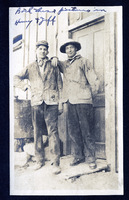
Photograph of Dalta Hurry and Raymond Jefferson, Goldfield (Nev.), early 1900s
Date
Archival Collection
Description
Image
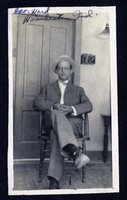
Photograph of George Ward, Goldfield (Nev.), early 1900s
Date
Archival Collection
Description
Image
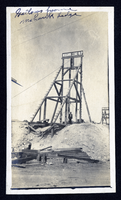
Photograph of Mohawk Ledge Mine gallows frame, Goldfield (Nev.), early 1900s
Date
Archival Collection
Description
Image
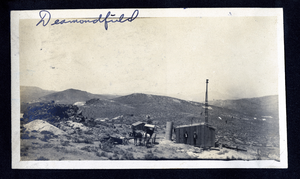
Photograph of Diamondfield Mine (Nev.), early 1900s
Date
Archival Collection
Description
Image
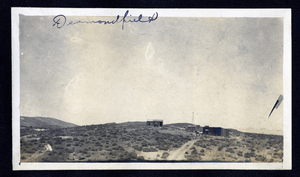
Photograph of Diamondfield Mine (Nev.), early 1900s
Date
Archival Collection
Description
Image
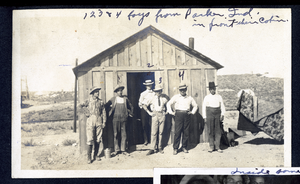
Photograph of miners from Parker, Indiana, Goldfield (Nev.), early 1900s
Date
Archival Collection
Description
Image
